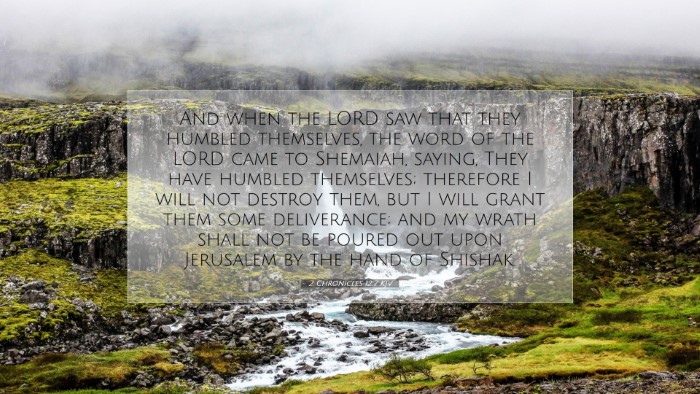Commentary on 2 Chronicles 12:7
In 2 Chronicles 12:7, we find the Lord’s response to King Rehoboam’s actions in leading the people of Judah into sin. The verse states:
"And when the Lord saw that they humbled themselves, the word of the Lord came to Shemaiah, saying, 'They have humbled themselves; therefore I will not destroy them, but I will grant them some deliverance.'"
Contextual Overview
This passage occurs in a critical moment during Rehoboam's reign, when he faced rebellion from the northern tribes of Israel. After a series of ungodly decisions, the king is confronted with the consequences of his actions. The intervention of God, through the prophet Shemaiah, reveals God’s mercy and the implications of humble repentance.
Theological Significance
This passage underscores a foundational biblical principle — the mercy of God in response to genuine humility.
- Divine Intervention: God’s grace is highlighted through the immediate response to the king's humility, illustrating that when His people seek Him earnestly, He is ready to restore.
- Humility and Repentance: The act of humbling oneself before God is of utmost importance. This response from Rehoboam serves as a model for believers, emphasizing the necessity of recognizing one’s faults.
- God's Mercy: The promise of deliverance demonstrates that even when judgment seems imminent, God's character inclines towards mercy when true repentance is shown.
Insights from Commentaries
Matthew Henry's Commentary
Matthew Henry emphasizes the significance of humility in this passage. He states, “The humbling of one’s self before God is the first step towards reconciliation.” He notes that despite Rehoboam's previous folly, the King’s humbling opened a channel for God’s mercy. Henry draws parallels between Rehoboam’s situation and the modern believer’s need for humility in confession and repentance.
Albert Barnes' Notes on the Bible
Albert Barnes reflects on the implications of God's deliverance. He points out that the phrase "I will grant them some deliverance" indicates partial mercy, suggesting that the trajectory of the nation was not entirely free from consequences. Barnes encourages leaders and individuals alike to observe how divine mercy often coexists with disciplinary action. He exhorts believers to seek genuine humility as a precursor to receiving God’s guidance and favor.
Adam Clarke's Commentary
Adam Clarke offers a detailed observation about the conditions under which God operates with His people. He articulates, “God shows leniency towards those who genuinely acknowledge their missteps and turn back towards Him.” Clarke reinforces the critical role of the prophetic voice, as seen in Shemaiah’s announcement, which serves to remind believers of the value of spiritual leadership and divine revelation. This responsibility of leaders to seek God at all costs is a recurring theme in Clarke’s writings.
Practical Applications for Today
For pastors, students, theologians, and Bible scholars engaged in ministry, this verse and its related commentaries provide profound insights into the nature of leadership and spiritual accountability:
- Embrace Humility: All leaders must cultivate a spirit of humility before God. Recognizing personal shortcomings can lead to a more profound dependency on divine wisdom and strength.
- Teach the Necessity of Repentance: The interconnectedness of humility and repentance should be integrated into teachings and sermons, highlighting their critical role in experiencing God’s grace.
- Encourage Intercession: Leaders and believers are called to intercede for their communities, taking cues from Shemaiah. Encouraging prayerful dependence on God’s direction can help avert spiritual calamities.
- Celebrate God’s Mercy: Where repentance occurs, it is essential to celebrate God’s merciful nature. This acknowledgment builds faith and reassures believers of God’s readiness to forgive.
Conclusion
2 Chronicles 12:7 serves as a pivotal verse that encapsulates the essence of God's response to humility and repentance. Through the insights of esteemed theologians and commentators, we see the enduring timelessness of these principles. As we engage with this text, we are called to reflect on our personal lives and the collective church’s posture before God, reminding us of the incredible power of humility in fostering divine mercy and guidance.


